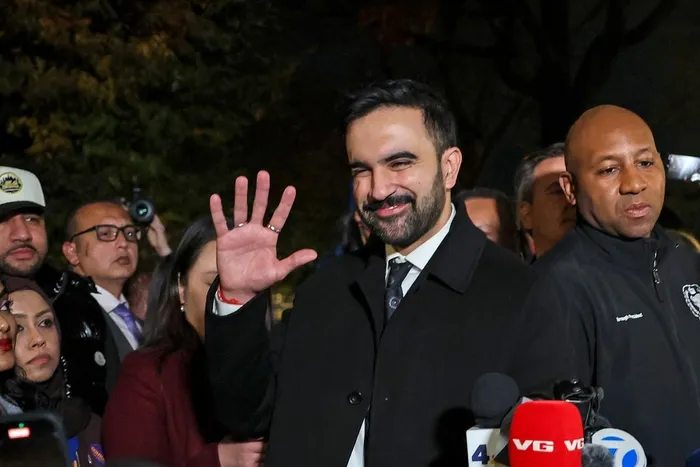
Zohran Mamdani's election as New York mayor caps an extraordinary rise for the leftist local lawmaker who emerged from relative obscurity to lead a supercharged campaign for the US megacity's top job.
Image: ANGELA WEISS / AFP
“New York, concrete jungle where dreams are made of, there’s nothing you can’t do…”
Right now, these iconic lyrics by Alicia Keys and Jay-Z are more than just an anthem for the city that never sleeps.
They feel like the perfect soundtrack for Zohran Mamdani’s historic rise as New York City’s newest mayor.
Viral TikTok videos from Mamdani’s campaign often show him singing along to Empire State of Mind.
He comes across not just as a politician seeking votes, but as a real New Yorker who reflects the energy, diversity, and resilience that make the city shine.
When Mamdani took the stage to deliver his victory speech as the newly elected mayor of New York City, the energy in the room was electric. “Donald Trump, I have four words for you: turn the volume up!” he declared, his voice ringing with unapologetic confidence.
This wasn’t just another political speech; it was a moment that symbolised the dawn of a new era in New York City politics.
Mamdani, a 34-year-old Democratic Socialist, represents a fresh, unconventional face of leadership for a city that thrives on reinvention.
His story is one of resilience, relatability, and breaking barriers, a narrative that resonates deeply with the diverse and dynamic population of New York.
Born in Uganda to Indian parents, Mamdani immigrated to the United States at the age of seven, spending part of his childhood in Cape Town before settling in New York.
His mother, Mira Nair, is a celebrated filmmaker (known for "Monsoon Wedding" and "Mississippi Masala"), and his father, Mahmood Mamdani, is a renowned scholar of African history. But Mamdani’s rise to political prominence wasn’t handed to him on a silver platter.
He became a naturalised US citizen in 2018, just seven years before this historic win. In a city built by immigrants, Mamdani’s journey reflects the quintessential New York dream where ambition, hard work, and a deep connection with the community can lead to transformational opportunities.
Mamdani’s victory was anything but conventional. While most politicians rely on traditional methods of outreach, Mamdani hit the streets and the clubs.
Late-night TikTok clips of him dancing behind DJ booths, singing along to Afrobeat hits, or addressing crowds at queer nightlife spaces like Papi Juice quickly became viral sensations.
One particularly memorable video, captioned “One night, six clubs, a Mayor for every hour,” showed him making stops at iconic Brooklyn spots like Damballa, Mood Ring, and Elsewhere.
This grassroots approach wasn’t just a clever social media strategy; it was a reflection of Mamdani’s philosophy: meeting New Yorkers where they are.
“He’s not just showing up for a photo op,” said one partygoer in a TikTok comment. “He’s comfortable, genuine, and tapped into the culture.”
Mamdani’s victory isn’t just a political win; it’s a cultural shift. As a Muslim, pro-Palestinian progressive, his platform focused on making New York City more affordable and equitable. He proposed increasing taxes on the wealthy, addressing housing crises, and investing in public infrastructure.
But it’s not just his policies that have won people over; it’s his ability to connect. Mamdani’s campaign posters were printed in multiple languages, including Yiddish, reflecting his commitment to inclusivity.
Political journalist Zohra Teke puts it best: “Mamdani became a voice for the voiceless. He echoed their concerns, frustrations, and hopes for a better, more affordable life. He resonated with their fears and cries for a safer city. He didn’t just listen; he delivered hope.”
Mamdani’s win is groundbreaking in many ways. Not only is he the first Muslim mayor of New York City, but he also represents a new wave of leadership that is younger, more diverse, and unafraid to challenge the status quo.
His historic victory speaks to the changing face of American politics, where grassroots movements and digital platforms can amplify voices that were once overlooked.
Related Topics: